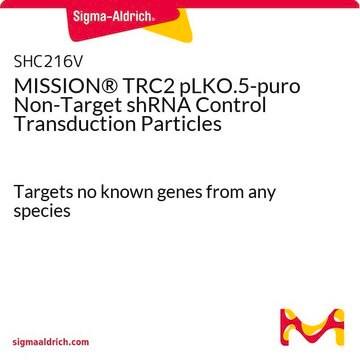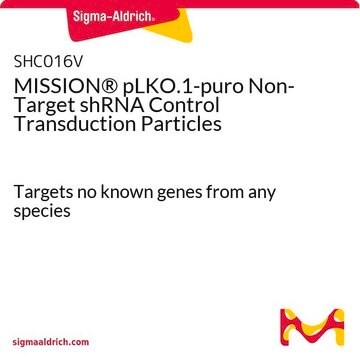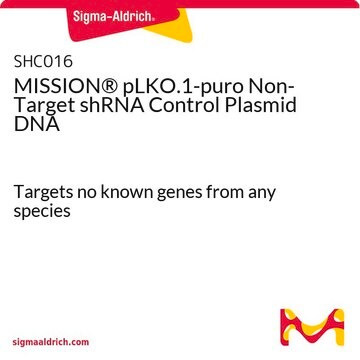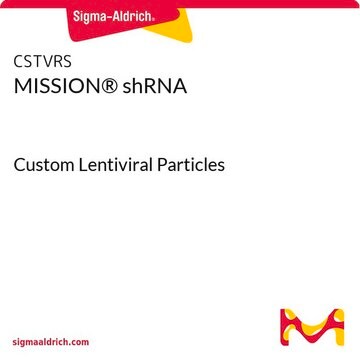推薦產品
一般說明
当使用MISSION® TRC shRNA克隆进行实验时,选择适当对照品是您的实验设计的关键要素,以便准确解释敲低结果。 MISSION对照转导颗粒是监测转导效率的关键阳性对照。
想要查看更多应用数据、实验方案和载体图谱,请访问 sigma.com/shrna。
想要查看更多应用数据、实验方案和载体图谱,请访问 sigma.com/shrna。
The MISSION TRC2 pLKO-puro Control Transduction Particles are produced from the sequence-verified lentiviral plasmid, TRC2 pLKO-puro Control Vector (SHC201). This vector is in the TRC2 pLKO-puro plasmid backbone, which contains the WPRE. The vector does not contain an shRNA insert and is useful as a negative control in experiments using the TRC2 MISSION shRNA library clones. This allows one to examine the effect of transduction on gene expression and interpret the knockdown effect seen with shRNA clones.
Unlike murine-based MMLV or MSCV retroviral systems, lentiviral-based particles permit efficient infection and integration of the construct into differentiated and non-dividing cells, such as neurons and dendritic cells, overcoming low transfection and integration difficulties when using these cell lines. Self-inactivating replication incompetent viral particles are produced in packaging cells (HEK293T) by co-transfection with compatible packaging plasmids.
In addition, the lentiviral transduction particles are pseudotyped with an envelope G glycoprotein from Vesicular Stomatitis Virus (VSV-G), allowing transduction of a wide variety of mammalian cells. 200 μl of 106 TU/ml (via p24 titering assay) lentiviral particles are provided as frozen stock.
When conducting experiments using MISSION shRNA clones, the proper controls should be a key element of your experimental design to allow for accurate interpretation of knockdown results.
Unlike murine-based MMLV or MSCV retroviral systems, lentiviral-based particles permit efficient infection and integration of the construct into differentiated and non-dividing cells, such as neurons and dendritic cells, overcoming low transfection and integration difficulties when using these cell lines. Self-inactivating replication incompetent viral particles are produced in packaging cells (HEK293T) by co-transfection with compatible packaging plasmids.
In addition, the lentiviral transduction particles are pseudotyped with an envelope G glycoprotein from Vesicular Stomatitis Virus (VSV-G), allowing transduction of a wide variety of mammalian cells. 200 μl of 106 TU/ml (via p24 titering assay) lentiviral particles are provided as frozen stock.
When conducting experiments using MISSION shRNA clones, the proper controls should be a key element of your experimental design to allow for accurate interpretation of knockdown results.
應用
Small interfering RNAs (siRNAs) expressed from short hairpin RNAs (shRNAs) are a powerful way to mediate gene specific RNA interference (RNAi) in mammalian cells. The MISSION product line is based on a viral vector-based RNAi library against annotated mouse and human genes. shRNAs that generate siRNAs intracellularly are expressed from amphotropic lentivirus viral particles, allowing screening in a wide range of mammalian cell lines. In these cell lines, MISSION shRNA clones permit rapid, cost efficient loss-of-function and genetic interaction screens.
To see more application data, protocols, vector maps visit sigma.com/shrna.
capture ELISA: 106 TU/mL using p24
法律資訊
MISSION is a registered trademark of Merck KGaA, Darmstadt, Germany
推薦
產品號碼
描述
訂價
儲存類別代碼
12 - Non Combustible Liquids
水污染物質分類(WGK)
WGK 3
閃點(°F)
Not applicable
閃點(°C)
Not applicable
分析證明 (COA)
輸入產品批次/批號來搜索 分析證明 (COA)。在產品’s標籤上找到批次和批號,寫有 ‘Lot’或‘Batch’.。
客戶也查看了
R Zufferey et al.
Journal of virology, 73(4), 2886-2892 (1999-03-12)
The expression of genes delivered by retroviral vectors is often inefficient, a potential obstacle for their widespread use in human gene therapy. Here, we explored the possibility that the posttranscriptional regulatory element of woodchuck hepatitis virus (WPRE) might help resolve
J E Donello et al.
Journal of virology, 72(6), 5085-5092 (1998-05-30)
The hepatitis B virus posttranscriptional regulatory element (HBVPRE) is a cis-acting RNA element that partially overlaps with enhancer I and is required for the cytoplasmic accumulation of HBV surface RNAs. We find that the closely related woodchuck hepatitis virus (WHV)
我們的科學家團隊在所有研究領域都有豐富的經驗,包括生命科學、材料科學、化學合成、色譜、分析等.
聯絡技術服務






